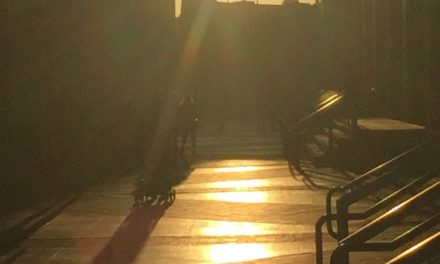There are many easy stereotypes one could assign to the 208 pages of The Tao of Wu: a celebrity autobiography, with inherent narcissism masked as gratitude; a tale of the hip-hop life, replete with salacious stories of crime, drugs, and empty justifications; a new-age reinterpretation of Taoism, barely skimming the surface to make the temporal sound more meaningful than it actually is.
Thankfully, these stereotypes have no staying power. What remains in the 208 pages are a thoughtful, spiritual journey through the life of RZA, founding member of the Wu-Tang Clan. Part autobiography, part meditation–the book offers so much more than a voyeurism into the life of the famous. It offers wide glimpses into a deep and flowing mind, moving like a powerful river through its many ruminations.
Much like the Biblical pursuit of Wisdom once co-opted by T.E. Lawrence, The book organizes around Seven Pillars of Wisdom. Not traditionally a chapter, each pillar reveals a bit of RZA’s story, from a young child inspired by the storytelling of Uncle Hollis, who set him on the spiritual path, to his epiphany with hip hop through the founding of the Wu-Tang Clan, the Clan’s meteoric success, and his darker periods following the deaths of his mother and his friend and Clan-mate Ol’ Dirty Bastard.
Each Pillar, however, is told more like a religious parable. It is here where the book transcends the stereotypical. From a very young age, it becomes obvious that RZA’s mind is one that seeks the spiritual truth. He begins with the Old and New Testament Bible stories from his North Carolina family, but he is quickly baptized in the theology of Mathematics and the 5% taught by the Nation of Islam. Not limited by these, a young RZA finds himself drunkenly stumbling into an all-night movie theater that plays Kung Fu movies, where he first witnesses Enter the Wu-Tang, which opens his eyes to the world of martial arts and the Eastern philosophies of Buddhism and Taoism. Here, he begins a life long obsession with Martial Arts, in film and in practice, and the lessons taught within. He even finds ways to work in his understanding of the game of chess as a philosophy. As the narrative of RZA’s life progresses, his accumulated spiritual learning is always present. Additionally within each section, musings on philosophy, famous sutras, brief aphorisms, religious parables, and instructions on prayers and meditations support the building of each Pillar.
As such, when RZA speaks of coming back from Ohio, walking the streets of Staten Island, and having the founding vision of starting the Clan, he doesn’t come off as some pretentious music star building his own legacy; he comes of as a man who has walked pursuing truth, imperfectly as we all do, and has been blessed by a gift bestowed upon him. In this moment, the tale is refreshing. Having studied, he knows many lessons that would lead him on a more righteous path. But at several points as a headstrong youth, he loses his way. Looking back, he is able to find an understanding in his missteps that evolve into his lifelong walk. And as the walk turns from the metaphoric to the literal, he sees the vision of the forming of the Wu-Tang Clan, a path so clear, he says, that he actually saved Method Man’s life when he calls him across the street to tell his plan and a robbery takes the place at the store where Mr. Meth was headed. In the hands of an egotistical star, this might come off as a trite “I knew I was blessed with a destiny” phrase; with RZA, however, his honest and thoughtful tale of falling in and out of The Way makes the epiphany not only plausible but humbly accepted.

As the narrative shifts to the success of the Wu-Tang Clan, the spirituality takes a subtle shift to the background as RZA’s knowledge of music, mixing, business, and commentary on the state of hip-hop and rap comes to the fore. RZA becomes a man obsessed with fulfilling his vision, exercising control over every aspect of the process, holding as philosophical about engineering and recording as he does about the divine. Yet all the while, the spiritual remains, weaving itself into his observations as a way to both explain success and provide succor in the darkest hours.
In short, I loved reading this book. I found myself not wanting to put it down, even when I had other work to do. I will pay it the highest compliment in these two ways.
First, as a musing on the spiritual life, I frequently found inspiration in this. Yes, a story of a man who rose from humble beginnings to found the most influential rap collective of the 90s (and some would argue of all time) is inspiring in the traditional forms of perseverance and dedication. But RZA’s wide and diverse body of knowledge is impressive. Often when I read in the morning, I crave something of a more spiritual nature to begin my day. RZA’s The Tao of Wu fit that bill, often setting my mind with a small koan to process in my waking hours.
This is not to say that I always agreed with his spiritual philosophies. I found his statements on numerology and the meanings of alphabetics to be pedantic at times. Towards the end of the book, he delves into historical analysis that I found to be trite. However, as a book that explores the spiritual path, as a man who has sought knowledge and wisdom as a guide through the twists and and turns of life, RZA’s musings represent a man who honestly seeks, not one who preaches. Spiritual truths are often ineffable truths and best not expressed in words, which belies the format of a book. And yet, his candor and openness in these moments are not preachy, but rather that of a man who has sought and seen and wishes to open his knowledge to others. It’s not often that a music star can turn humble and philosophical, but this rare gem is an excellent read for the music fan and the spiritually minded alike.



Recent Comments